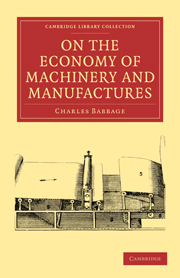Book contents
- Frontmatter
- PREFACE
- Contents
- INTRODUCTION: STATEMENT OF THE OBJECT AND PLAN OF THE WORK
- CHAPTER I SOURCES OF THE ADVANTAGES ARISING FROM MACHINERY AND MANUFACTURES
- CHAPTER II ACCUMULATING POWER
- CHAPTER III REGULATING POWER
- CHAPTER IV INCREASE AND DIMINUTION OF VELOCITY
- CHAPTER V EXTENDING TIME OF ACTION OF FORCES
- CHAPTER VI SAVING TIME IN NATURAL OPERATIONS
- CHAPTER VII EXERTING FORCES TOO GREAT FOR HUMAN POWER, AND EXECUTING OPERATIONS TOO DELICATE FOR HUMAN TOUCH
- CHAPTER VIII REGISTERING OPERATIONS
- CHAPTER IX ECONOMY OF MATERIALS EMPLOYED
- CHAPTER X OF THE IDENTITY OF THE WORK WHEN IT IS OF THE SAME KIND, AND OF ITS ACCURACY WHEN OF DIFFERENT KINDS
- CHAPTER XI OF COPYING
- CHAPTER XII ON THE METHOD OF OBSERVING MANUFACTORIES
- CHAPTER XIII ON THE DIFFERENCE BETWEEN MAKING AND MANUFACTURING
- CHAPTER XIV ON THE INFLUENCE OF VERIFICATION ON PRICE
- CHAPTER XV ON THE INFLUENCE OF DURABILITY ON PRICE
- CHAPTER XVI ON PRICE, AS MEASURED BY MONEY
- CHAPTER XVII OF RAW MATERIALS
- CHAPTER XVIII OF THE DIVISION OF LABOUR
- CHAPTER XIX ON THE DIVISION OF MENTAL LABOUR
- CHAPTER XX ON THE SEPARATE COST OF EACH PROCESS IN A MANUFACTURE
- CHAPTER XXI ON THE CAUSES AND CONSEQUENCES OF LARGE FACTORIES
- CHAPTER XXII ON THE POSITION OF GREAT FACTORIES
- CHAPTER XXIII ON OVER-MANUFACTURING
- CHAPTER XXIV INQUIRIES PREVIOUS TO COMMENCING ANY MANUFACTORY
- CHAPTER XXV ON CONTRIVING MACHINERY
- CHAPTER XXVI PROPER CIRCUMSTANCES FOR THE APPLICATION OF MACHINERY
- CHAPTER XXVII ON THE DURATION OF MACHINERY
- CHAPTER XXVIII ON COMBINATION AMONGST MASTERS OR WORKMEN AGAINST EACH OTHER
- CHAPTER XXIX ON COMBINATIONS OF MASTERS AGAINST THE PUBLIC
- CHAPTER XXX ON THE EFFECT OF TAXES AND OF LOCAL RESTRICTIONS UPON MANUFACTURES
- CHAPTER XXXI ON THE EXPORTATION OF MACHINERY
- CHAPTER XXXII ON THE FUTURE PROSPECTS OF MANUFACTURES, AS CONNECTED WITH SCIENCE
CHAPTER XIX - ON THE DIVISION OF MENTAL LABOUR
Published online by Cambridge University Press: 29 August 2010
- Frontmatter
- PREFACE
- Contents
- INTRODUCTION: STATEMENT OF THE OBJECT AND PLAN OF THE WORK
- CHAPTER I SOURCES OF THE ADVANTAGES ARISING FROM MACHINERY AND MANUFACTURES
- CHAPTER II ACCUMULATING POWER
- CHAPTER III REGULATING POWER
- CHAPTER IV INCREASE AND DIMINUTION OF VELOCITY
- CHAPTER V EXTENDING TIME OF ACTION OF FORCES
- CHAPTER VI SAVING TIME IN NATURAL OPERATIONS
- CHAPTER VII EXERTING FORCES TOO GREAT FOR HUMAN POWER, AND EXECUTING OPERATIONS TOO DELICATE FOR HUMAN TOUCH
- CHAPTER VIII REGISTERING OPERATIONS
- CHAPTER IX ECONOMY OF MATERIALS EMPLOYED
- CHAPTER X OF THE IDENTITY OF THE WORK WHEN IT IS OF THE SAME KIND, AND OF ITS ACCURACY WHEN OF DIFFERENT KINDS
- CHAPTER XI OF COPYING
- CHAPTER XII ON THE METHOD OF OBSERVING MANUFACTORIES
- CHAPTER XIII ON THE DIFFERENCE BETWEEN MAKING AND MANUFACTURING
- CHAPTER XIV ON THE INFLUENCE OF VERIFICATION ON PRICE
- CHAPTER XV ON THE INFLUENCE OF DURABILITY ON PRICE
- CHAPTER XVI ON PRICE, AS MEASURED BY MONEY
- CHAPTER XVII OF RAW MATERIALS
- CHAPTER XVIII OF THE DIVISION OF LABOUR
- CHAPTER XIX ON THE DIVISION OF MENTAL LABOUR
- CHAPTER XX ON THE SEPARATE COST OF EACH PROCESS IN A MANUFACTURE
- CHAPTER XXI ON THE CAUSES AND CONSEQUENCES OF LARGE FACTORIES
- CHAPTER XXII ON THE POSITION OF GREAT FACTORIES
- CHAPTER XXIII ON OVER-MANUFACTURING
- CHAPTER XXIV INQUIRIES PREVIOUS TO COMMENCING ANY MANUFACTORY
- CHAPTER XXV ON CONTRIVING MACHINERY
- CHAPTER XXVI PROPER CIRCUMSTANCES FOR THE APPLICATION OF MACHINERY
- CHAPTER XXVII ON THE DURATION OF MACHINERY
- CHAPTER XXVIII ON COMBINATION AMONGST MASTERS OR WORKMEN AGAINST EACH OTHER
- CHAPTER XXIX ON COMBINATIONS OF MASTERS AGAINST THE PUBLIC
- CHAPTER XXX ON THE EFFECT OF TAXES AND OF LOCAL RESTRICTIONS UPON MANUFACTURES
- CHAPTER XXXI ON THE EXPORTATION OF MACHINERY
- CHAPTER XXXII ON THE FUTURE PROSPECTS OF MANUFACTURES, AS CONNECTED WITH SCIENCE
Summary
(183.) We have already mentioned what may, perhaps, appear paradoxical to some of our readers,—that the division of labour can be applied with equal success to mental operations, and that it ensures, by its adoption, the same economy of time. A short account of its practical application, in the most extensive series of calculations ever executed, will offer an interesting illustration of this fact, whilst at the same time it will afford an occasion for shewing that the arrangements which ought to regulate the interior economy of a manufactory, are founded on principles of deeper root than may have been supposed, and are capable of being usefully employed in paving the road to some of the sublimest investigations of the human mind.
(184.) In the midst of that excitement which accompanied the Revolution of France and the succeeding wars, the ambition of the nation, unexhausted by its fatal passion for military renown, was at the same time directed to the nobler and more permanent triumphs which mark the era of a people's greatness,—and which receive the applause of posterity long after their conquests have been wrested from them, or even when their existence as a nation may be told only by the page of history. Amongst their enterprises of science, the French government was desirous of producing a series of mathematical tables, which should facilitate the extension of the decimal system they had so recently adopted. They directed, therefore, their mathematicians to construct such tables, on the most extensive scale.
- Type
- Chapter
- Information
- On the Economy of Machinery and Manufactures , pp. 153 - 163Publisher: Cambridge University PressPrint publication year: 2010First published in: 1832

